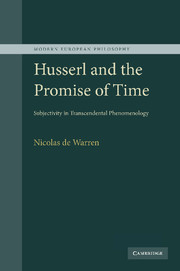Book contents
- Frontmatter
- Contents
- Acknowledgments
- List of abbreviations
- Introduction: the promise of time: subjectivity in Husserl's transcendental phenomenology
- 1 The ritual of clarification
- 2 A rehearsal of difficulties
- 3 The ghosts of Brentano
- 4 The retention of time past
- 5 The impossible puzzle
- 6 The lives of Others
- 7 The life of consciousness
- Appendix: note on textual sources
- Bibliography
- Index
Appendix: note on textual sources
Published online by Cambridge University Press: 20 January 2010
- Frontmatter
- Contents
- Acknowledgments
- List of abbreviations
- Introduction: the promise of time: subjectivity in Husserl's transcendental phenomenology
- 1 The ritual of clarification
- 2 A rehearsal of difficulties
- 3 The ghosts of Brentano
- 4 The retention of time past
- 5 The impossible puzzle
- 6 The lives of Others
- 7 The life of consciousness
- Appendix: note on textual sources
- Bibliography
- Index
Summary
Husserl never originally produced a completed manuscript for the 1905 lectures “Phenomenology of Inner Time-Consciousness.” An entire lecture manuscript is not extant and many indications suggest that Husserl composed these lectures in an ad hoc fashion, patching together materials from earlier lectures and notes along with material newly written. The ad hoc nature of these lectures is furthermore apparent from the fact that Husserl may have even read directly to his students from his own notes from Brentano's “unforgettable” Vienna lectures of 1885/86. Over a period of years after 1905, Husserl subsequently incorporated newly produced manuscripts into the folder entitled “Zeitbewußtsein” containing the original bundle of lecture manuscripts. Husserl was in the habit of removing individual pages from his original lecture manuscript and replacing them with revised material. In 1917, Husserl entrusted this folder of manuscripts to his assistant Edith Stein with the expressed wish that she prepare the materials for publication – a request that granted Stein a degree of latitude to compose the envisioned work, but also placed on her the substantial burden of working out the details of what were often fragmentary and ever-changing analyses. Husserl's vision of his phenomenological movement contributed to this habit of parceling out individual domains of research to his assistants and charging them with the task of pursuing the intricacies of phenomenological investigations.
- Type
- Chapter
- Information
- Husserl and the Promise of TimeSubjectivity in Transcendental Phenomenology, pp. 291 - 295Publisher: Cambridge University PressPrint publication year: 2009



